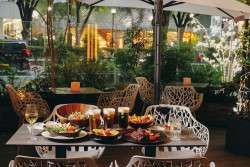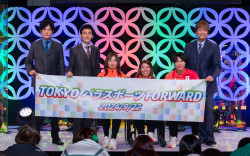
Originally published on metropolis.co.jp on August 2008
Serendip lies on a quiet side street in a quiet Shibuya neighborhood, next to the romantically wooded Hikawa shrine. You enter through a plant shop that in the evening has a “Closed” sign hung on the door. Never mind, walk in and past the potted cacti.
The box-like dining room will be too bright. Its mix of track lighting, Art Deco ceiling lamps, and wall sconces achieve an illumination better suited to a dentist’s office. But never mind that, either. Soon you’ll be concentrating on the marvelous things on your plate.
The mood is nonchalant. The decor is “antique eclectic.” And the place fills up quickly with folks from the neighborhood and those who’ve found it by lucky accident.
In the kitchen, chef Hamana is doing what he loves: making ingredients taste as good as they can. His menu focuses on fish—fresher and tastier than those from Tsukiji because they’re caught near Odawara, 90 minutes southwest of Tokyo—and on organic vegetables grown in Tochigi.
Serendip’s motto is “Pura Vida” (Hamana speaks some Spanish) and demonstrates its pure life by listing the provenance of everything that goes into your meal, including the salt, on the back of the menu.
On arrival, I found a handwritten welcome note on the table, with a simple English translation of all the fish available that day. “Bartailed Flathead,” kochi in Japanese, headed the list and was featured in one of Hamana’s signature dishes, the cocotte of roasted vegetables and fish (¥2,000).
Inside the heavy-lidded, black-iron cocotte was a mélange of eggplant, potato, zucchini, onion, carrot, cauliflower florets, and chunks of bartailed flathead. Steam-roasted in their own juices, they are rendered tender and extremely flavorful. Two dipping sauces—a ponzu with spicy, finely grated daikon, and a tomato miso—come with this dish, plus a tiny saucer of Javanese salt, if you prefer a simpler seasoning.
Everything I tried was excellent: sparkling fresh aji sashimi (¥1,200), dice-sized cubes of raw maguro lathered with freshly ground sesame (¥1,000), grilled eggplant with savory miso (¥700), a refreshing dashi-based broth of tomato concassé, celery, and tiny shirasu fish (¥800), and finally, rice cooked with fresh ginger and shirasu (¥1,800). Dessert was an amazing kinako “milkshake” (¥500), a cool, refreshing concoction made from sweet soy powder.
Serendip’s selection of jizake and shochu is extensive and well-chosen. Try the Jokigen, a very fine junmaishu (¥1,000 ) that’s guaranteed to put you in a good mood. The sake is poured until it flows over the lip of the glass and into the small lacquered “coaster” container.
The grace note to the meal was a glass of Yagenso (¥600), a new Japanese liqueur made from 13 healthy herbs and spices blended together in a sweet, but not too sweet, cordial.
Blue Six, an ultracool house groove combo, was on the speakers that night, sending out soulful vibes made for chilling—the perfect soundtrack for what Serendip does every night.









